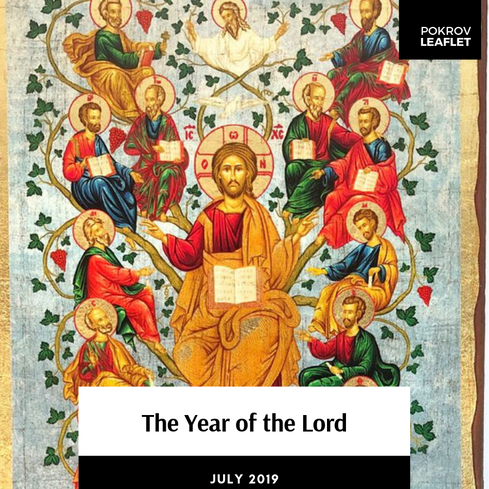
THE YEAR OF THE LORD
The feast of Pentecost completes the so-called ‘festal’ part of the Church year. It begins with the Advent, a preparation for the Nativity of the Lord, Christmas. This part of the year unfolds the story of the whole Bible. What is the Bible about? It is a conversation of God with His people, a dialogue about the meaning and fulfilment human life. It is about ‘salvation’.
The Advent presents a picture of God’s people looking forward towards the Saviour, Christ. The patriarchs and the prophets of the Old Testament contemplate humanity’s loss of paradise. In the fullness of time, when the best minds and hearts acknowledge mankind’s helplessness – the Word becomes flesh. Jesus the Saviour is born from the Holy Spirit and the Virgin Mary, as we proclaim in the Nicene Creed.
Our series this year has gone through the sequence of fasts and feasts leading up to the central event of the year – and of history – the Resurrection of Christ, and further to the stories of His meetings with the disciples until the Ascension, when He instructs them to wait for the promised Comforter, the Holy Spirit.
On the Sunday following Pentecost, we celebrate the memory of all saints. This is the response of humanity in its dialogue with God. The best human beings: “the apostles, the martyrs and the prophets” – are lit up by the fire of Pentecost, the fire that the Lord has brought to this earth, wishing for it to spread (Mk.12:49). He also said that knowing the truth would make us free (Jn. 8:32). He is the Truth. Knowing Him means establishing an existential relationship with Him, the Vine, connecting through baptism and life as branches (Jn.15:4-5). This second part of the year, which speaks of our response – presents a multitude of “worked examples” – the lives of saints.
The saints are dear to us because their starting point is the same as ours: fallen, weak and vulnerable humanity. The difference is their commitment. As St Seraphim explains, it is commitment that makes miracles. The greatest miracle is the transformation, transfiguration of humanity in the life that for them – and for us - begins in baptism.
“The life in Christ”. In the late 14th century, Western humanism was gaining strength and preparing the way for the Renaissance, a rebirth of man- centred worldview of Greco-Roman antiquity. At the same time, Nicholas Cabasilas, a Byzantine aristocrat and monk, wrote his book, which proclaimed the traditional Christian view that our life originates in Christ. Just like Cabasilas, writing in the decades before another cataclysm, St John of Kronstadt wrote “My life in Christ”, a spiritual diary filled with practical observations. All the Saints teach us through the example of their lives and through their writings about the same thing: the life in Christ. In pious Orthodox families of the past, the favourite stories read to children were the lives of saints. Unlike secular self-seeking heroes of modernity, the saints taught about the sacrificial love of God and our neighbour. The same lives of saints are read to this day in monasteries and were for me one of the formative influences during my seminary years within Holy Trinity Monastery, Jordanville.
The Saints provide us with a detailed description how the life in grace grows in parallel with an intense inner warfare that is needed to free up space in the heart for the Kingdom of Heaven. Every Christian is called to become a warrior of Christ from the moment of renouncing Satan before baptism. This is a declaration of war. According to the Bible, humanity became enslaved by the Adversary until the Saviour destroyed his power over us. However, this does not mean that all a Christian needs to do is to declare his allegiance to the belief or ideology that Christ is the winner. It means that the devil can no longer hold us by force, against our will. He can and tries to hold us in his camp because of our sins or more precisely our ‘passions’ which are an expression of our lack of spiritual freedom. Knowing the Truth, entering into a relationship with Christ shows us the real state of affairs. When we realise the extent of our captivity we turn to the Saviour for help and can win with Him. Orthodoxy emphasises the need to take responsibility for our life, to carry our cross in following Christ. The Saviour stresses that the person who tries to follow Him without carrying his cross is not worthy of Him (Mat.10:38).What are these sins and passions? They are no different from dependence, drug or alcoholic habits and include things like envy, anger, greed and others at every level of human being or life: the body, the soul and the spirit.
In attempting to keep the commandments of God, we discover our weaknesses; that we cannot win by ourselves. St Paul dedicated his life to teaching Christians that we cannot be saved by keeping the law. The law of God only helps us to understand that we need the Saviour. However, that is an important step in the journey of our salvation because as the Bible says – God resists the proud and gives His grace to the humble (James 4:6). The saints give many lessons through their lives and writings that this is the most important point of our spiritual work: to grow in humility; to understand that without God we are nothing and can do nothing. St Isaac the Syrian (6th Century ascetic) writes that all of our prayers, services, sacraments and good deeds have as their goal the achievement of humility. If his does not happen, we are wasting our time – of even worse – becoming more proud of ourselves and distanced from God.
Archpriest Nicholas Karipoff
The feast of Pentecost completes the so-called ‘festal’ part of the Church year. It begins with the Advent, a preparation for the Nativity of the Lord, Christmas. This part of the year unfolds the story of the whole Bible. What is the Bible about? It is a conversation of God with His people, a dialogue about the meaning and fulfilment human life. It is about ‘salvation’.
The Advent presents a picture of God’s people looking forward towards the Saviour, Christ. The patriarchs and the prophets of the Old Testament contemplate humanity’s loss of paradise. In the fullness of time, when the best minds and hearts acknowledge mankind’s helplessness – the Word becomes flesh. Jesus the Saviour is born from the Holy Spirit and the Virgin Mary, as we proclaim in the Nicene Creed.
Our series this year has gone through the sequence of fasts and feasts leading up to the central event of the year – and of history – the Resurrection of Christ, and further to the stories of His meetings with the disciples until the Ascension, when He instructs them to wait for the promised Comforter, the Holy Spirit.
On the Sunday following Pentecost, we celebrate the memory of all saints. This is the response of humanity in its dialogue with God. The best human beings: “the apostles, the martyrs and the prophets” – are lit up by the fire of Pentecost, the fire that the Lord has brought to this earth, wishing for it to spread (Mk.12:49). He also said that knowing the truth would make us free (Jn. 8:32). He is the Truth. Knowing Him means establishing an existential relationship with Him, the Vine, connecting through baptism and life as branches (Jn.15:4-5). This second part of the year, which speaks of our response – presents a multitude of “worked examples” – the lives of saints.
The saints are dear to us because their starting point is the same as ours: fallen, weak and vulnerable humanity. The difference is their commitment. As St Seraphim explains, it is commitment that makes miracles. The greatest miracle is the transformation, transfiguration of humanity in the life that for them – and for us - begins in baptism.
“The life in Christ”. In the late 14th century, Western humanism was gaining strength and preparing the way for the Renaissance, a rebirth of man- centred worldview of Greco-Roman antiquity. At the same time, Nicholas Cabasilas, a Byzantine aristocrat and monk, wrote his book, which proclaimed the traditional Christian view that our life originates in Christ. Just like Cabasilas, writing in the decades before another cataclysm, St John of Kronstadt wrote “My life in Christ”, a spiritual diary filled with practical observations. All the Saints teach us through the example of their lives and through their writings about the same thing: the life in Christ. In pious Orthodox families of the past, the favourite stories read to children were the lives of saints. Unlike secular self-seeking heroes of modernity, the saints taught about the sacrificial love of God and our neighbour. The same lives of saints are read to this day in monasteries and were for me one of the formative influences during my seminary years within Holy Trinity Monastery, Jordanville.
The Saints provide us with a detailed description how the life in grace grows in parallel with an intense inner warfare that is needed to free up space in the heart for the Kingdom of Heaven. Every Christian is called to become a warrior of Christ from the moment of renouncing Satan before baptism. This is a declaration of war. According to the Bible, humanity became enslaved by the Adversary until the Saviour destroyed his power over us. However, this does not mean that all a Christian needs to do is to declare his allegiance to the belief or ideology that Christ is the winner. It means that the devil can no longer hold us by force, against our will. He can and tries to hold us in his camp because of our sins or more precisely our ‘passions’ which are an expression of our lack of spiritual freedom. Knowing the Truth, entering into a relationship with Christ shows us the real state of affairs. When we realise the extent of our captivity we turn to the Saviour for help and can win with Him. Orthodoxy emphasises the need to take responsibility for our life, to carry our cross in following Christ. The Saviour stresses that the person who tries to follow Him without carrying his cross is not worthy of Him (Mat.10:38).What are these sins and passions? They are no different from dependence, drug or alcoholic habits and include things like envy, anger, greed and others at every level of human being or life: the body, the soul and the spirit.
In attempting to keep the commandments of God, we discover our weaknesses; that we cannot win by ourselves. St Paul dedicated his life to teaching Christians that we cannot be saved by keeping the law. The law of God only helps us to understand that we need the Saviour. However, that is an important step in the journey of our salvation because as the Bible says – God resists the proud and gives His grace to the humble (James 4:6). The saints give many lessons through their lives and writings that this is the most important point of our spiritual work: to grow in humility; to understand that without God we are nothing and can do nothing. St Isaac the Syrian (6th Century ascetic) writes that all of our prayers, services, sacraments and good deeds have as their goal the achievement of humility. If his does not happen, we are wasting our time – of even worse – becoming more proud of ourselves and distanced from God.
Archpriest Nicholas Karipoff
